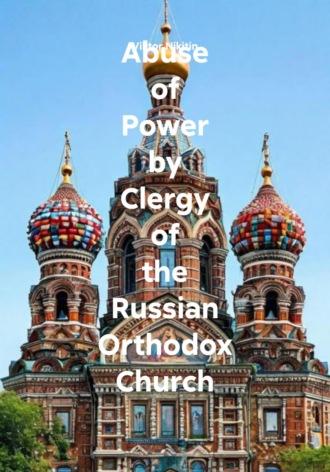
Полная версия
Abuse of Power by Clergy of the Russian Orthodox Church

Viktor Nikitin
Abuse of Power by Clergy of the Russian Orthodox Church
Abuse of power by clergy of the Russian Orthodox Church
Abuses occur when a priest assumes power and authority without allowing parishioners the opportunity to question or challenge his decisions. This shift implies moving from general respect for a priest to one in which parishioners loyally submit to him without objection. This includes, for example, the abuse and excessive incidence of the so-called "church discipline." As a result, parishioners may suffer from psychological problems and exhibit symptoms associated with post-traumatic stress disorder (PTSD).
In February 2007, I became a parishioner of the Church of Our Lady of Kazan in Uzkoe, a historic estate in southwest Moscow. The senior priest of the church was Archimandrite Peter (Nikolai Petrovich Polyakov), a rude and ill-mannered man. He would interrupt the Devine Service at the most sacred moment to reprimand a parishioner for an accidental cough. Moreover, during the Service, he would send his altar servers to escort the accidentally coughing parishioner out of the church and onto the porch.
I remained in Father Peter's parish until August 2008, when Russia invaded neighboring Georgia with the tacit consent of the Russian Orthodox Church. I could not believe that one Orthodox nation was fighting another Orthodox nation, and the Russian Church was not protesting. So I began attending the Moscow Georgian community Church of Saint George in Gruziny – a former Georgian settlement on the banks of the Presnya River, before it flows into the pond that is now part of the Moscow Zoo. They were collecting donations there to help those affected by the Russian invasion.
In February 2009, I began attending the Church of the Holy Life-Giving Trinity in Khokhly, a historic district in central Moscow, not far from a former Ukrainian settlement. The senior priest of the church was Father Alexey Anatolyevich Uminsky. He was not that rude and usually had quite good manners but at least to my mind, he was an unkind and unchristian person. I knew him fairly well since he offered me a position of his altar server and I accepted it. I assisted him during Devine Services for almost six months, but eventually, I had to apologize and quit my altar service. Many a time he would lose his temper and would loudly shout at my fellow altar servers during the Service, which was incompatible to my idea of a good Christian.
Therefore, unfortunately, neither Father Peter nor Father Alexius taught me anything positive and kind. By the Grace of God, I had my Christian education at the Russian Saint Panteleimon Monastery on Athos in Greece much later, in 2013-2017.
* * *
A few words about what struck me most about Father Alexius. Every Sunday after the Service, the congregation would gather for a communal meal and religious discussion. The parishioners on duty, in turn, would prepare simple food for the laity and a quite varied selection for the clergy and those seated at their table. The privileged ones would eat not from plastic plates with plastic forks and spoons, like the parishioners, but from ceramic dishes and metal utensils.
However, even among the privileged, one man was more privileged than the others were. That, of course, was Father Alexius. He would have exquisite, refined, and unique delicacies, unusual in flavor or more expensive than the food served to the laity. He would eat from real chinaware, using stainless steel forks and knives. Of course, it is the retinue that makes the king, but only with his consent, I suppose. To my mind, that was real personality cult and the community of his parishioners looked like a sect to me.
* * *
I would especially like to tell about Abbess Xenia (Irina Yuryevna Zaytseva), Mother Superior of the Holy Trinity Novo-Golutvin Convent in Kolomna, in the Moscow Region, on the Oka River. My classmate in secondary school, Natasha Shuvayeva, introduced me to her. Natasha was a fellow-student of Irina Zaytseva in the Department of Journalism at Moscow State University.
Abbess Xenia was not a cleric, but she was the most extraordinary and extravagant nun I have ever seen. She controlled the priests of her Convent and ordered them to hear confessions of nuns and pilgrims whenever and however she pleased.
One day Natasha, her daughter and I came to see Mother Xenia in her Convent. After small talk, she told us that we had to confess. She took us to the Church of Blessed Xenia of St. Petersburg in the basement of the Holy Trinity Church, gave pens and sheets of paper and instructed us to write down about the dirtiest carnal sins we had ever committed. She would come up to each of us, look across the shoulder at our notes and instructed to write down every dirty detail of each sin. I was quite confused but I guess Natasha and her daughter were confused even more. After the confessions we parted with Mother Xenia, and on the way back home, Natasha asked we what all that was and is she could call it churching or confirmation. I answered that I doubted that and I that I could not find a proper word for it.
* * *
“Orthodoxy with a Human Face”
The Church is fundamentally an authoritarian structure that does not tolerate any dissent. In the Gospel of Mark, we read how Jesus "looked sternly at the leper and pushed him away" (Mark 1:43-45).
Конец ознакомительного фрагмента.
Текст предоставлен ООО «Литрес».
Прочитайте эту книгу целиком, купив полную легальную версию на Литрес.
Безопасно оплатить книгу можно банковской картой Visa, MasterCard, Maestro, со счета мобильного телефона, с платежного терминала, в салоне МТС или Связной, через PayPal, WebMoney, Яндекс.Деньги, QIWI Кошелек, бонусными картами или другим удобным Вам способом.









